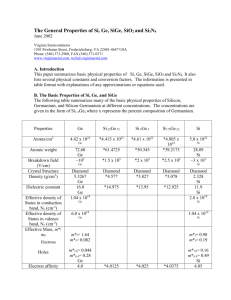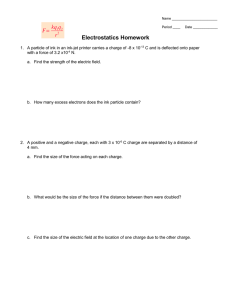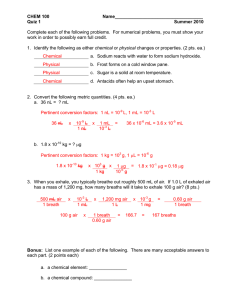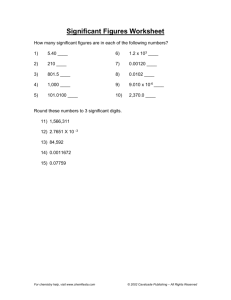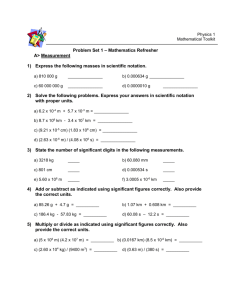The General Properties of Si, Ge, SiGe, SiO2 and Si3N4
advertisement
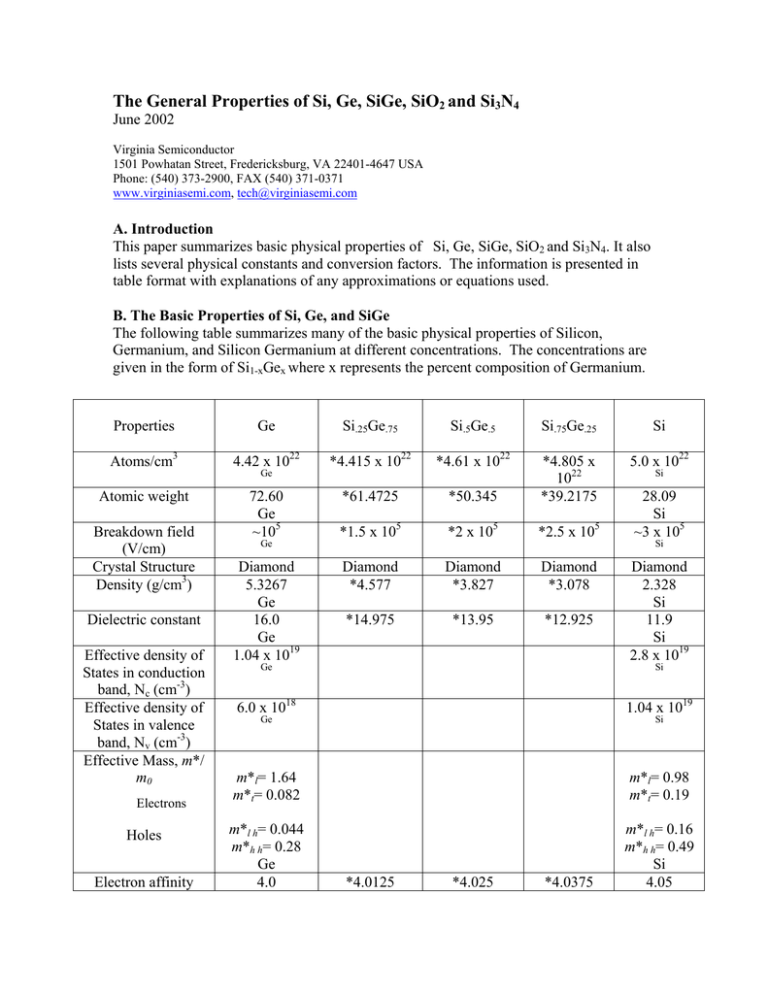
The General Properties of Si, Ge, SiGe, SiO2 and Si3N4 June 2002 Virginia Semiconductor 1501 Powhatan Street, Fredericksburg, VA 22401-4647 USA Phone: (540) 373-2900, FAX (540) 371-0371 www.virginiasemi.com, tech@virginiasemi.com A. Introduction This paper summarizes basic physical properties of Si, Ge, SiGe, SiO2 and Si3N4. It also lists several physical constants and conversion factors. The information is presented in table format with explanations of any approximations or equations used. B. The Basic Properties of Si, Ge, and SiGe The following table summarizes many of the basic physical properties of Silicon, Germanium, and Silicon Germanium at different concentrations. The concentrations are given in the form of Si1-xGex where x represents the percent composition of Germanium. Properties Ge Si.25Ge.75 Si.5Ge.5 Si.75Ge.25 Si Atoms/cm3 4.42 x 1022 *4.415 x 1022 *4.61 x 1022 5.0 x 1022 Atomic weight 72.60 Ge ~105 *61.4725 *50.345 *4.805 x 1022 *39.2175 *1.5 x 105 *2 x 105 *2.5 x 105 Diamond *4.577 Diamond *3.827 Diamond *3.078 *14.975 *13.95 *12.925 Breakdown field (V/cm) Crystal Structure Density (g/cm3) Dielectric constant Effective density of States in conduction band, Nc (cm-3) Effective density of States in valence band, Nv (cm-3) Effective Mass, m*/ m0 Electrons Holes Electron affinity Ge Ge Diamond 5.3267 Ge 16.0 Ge 1.04 x 1019 Ge Si 28.09 Si ~3 x 105 Si Diamond 2.328 Si 11.9 Si 2.8 x 1019 Si 6.0 x 1018 1.04 x 1019 m*l= 1.64 m*t= 0.082 m*l= 0.98 m*t= 0.19 m*l h= 0.044 m*h h= 0.28 Ge 4.0 m*l h= 0.16 m*h h= 0.49 Si 4.05 Ge Si *4.0125 *4.025 *4.0375 X(V) Minimum Indirect Energy Gap (eV) at 300K Minimum Direct Energy Gap (eV) Intrinsic carrier concentration (cm-3) Intrinsic Debye length (µm) Intrinsic resistivity (Ω-cm) Lattice Constant (A) Ge 0.66 Ge .7 Ge 2.4 x 1013 Ge 0.68 Ge 47 Ge ***5.6575 Ge 5.8 x 10-6 ***0.804 ***0.945 ***1.05 1.6 2.5 3.1 *1.8 x 1013 *1.2 x 1013 *0.6 x 1013 *6.51 *12.34 *18.17 *.575 x 105 *1.15 x 105 *1.725 x 105 ***5.5373 ***5.4825 ***5.5960 Si 1.12 Si 3.4 Si 1.45 x 1010 Si 24 Si 2.3 x 105 Si ***5.4310 Si 2.6 x 10-6 *5.0 x 10-6 *4.2 x 10-6 *3.4 x 10-6 *1056.5 *1176 *1295.5 *1.375 x 10-3 *1.75 x 10-3 *2.125 x 10- 3900(electron) 1900(hole) Ge 0.037 Ge 105 Ge *3300(electron) *1537.5(hole) *7700(electron) *1175(hole) Specific heat (J/g°C) Thermal conductivity at 300 K (W/cm-°C) Thermal diffusivity (cm2/s) 0.31 Ge 0.6 Ge *.4075 *.505 **.11 **.083 0.36 Ge *0.495 *.63 *.765 0.9 Si Vapor pressure (Pa) 1 at 1330°C 10-6 at 760°C Ge 1 at *1410°C 10-6 at *795 1 at *1490°C 10-6 at *830°C 1 at *1570°C 10-6 at *865°C 1 at 1650°C 10-6 at 900°C Si Linear coefficient of thermal expansion, ∆L/L∆T (°C-1) Melting point (°C) Minority carrier lifetime (s) Mobility (drift) (cm2/V-s) Ge 937 Ge 10-3 Ge Optical – phonon energy (eV) Phonon mean free path λ0(Å) 3 Si 1415 Si 2.5 x 10-3 Si *2100(electron) 1500(electron) *812.5(hole) 450(hole) Si 0.063 Si 76 (electron) 55 (hole) Si *.6025 0.7 Si **.085 1.5 Si * value was derived through linear approximation ; ** value was derived through subjective observation of graph/diagram [1]; *** value was derived through quadratic approximation TABLE 1 lists physical properties of Si, Ge, and SiGe [2][3] The linear approximations were calculated using the following function where CSi represents the Silicon value, CGe represents the Germanium value, and x represents the fractional composition of Germanium: a(x)= CSi (1-x) + CGe (x). All values in the above table for SiGe are %atm values. The values for the thermal conductivity were taken from a graph[1][7]. The values for the minimum indirect energy gap were determined from both a graph[1][8] and also from the following quadratic expression where x represents the fractional composition of Germanium: Eg(x)= (1.155 – 0.43x + 0.0206x2 )eV for 0 < x < 0.85 [1][5] Eg(x)= (2.010 – 1.27x)eV for 0.85 < x < 1 [1][5] and The values for the minimum direct energy gap were determined from references [1],[6]. The lattice constants were determined using the following quadratic expression where x represents the percent of Germanium in the composition: a(x) = 0.002733x2 + 0.01992x + 0.5431 (nm)[9]. C. The Basic Properties of SiO2 and Si3N4 Insulator: Structure Melting Point (°C) Density (g/cm3) Refractive index Dielectric constant Dielectric strength (V/cm) Infrared absorption band (µm) Energy gap Thermal Expansion coefficient (°C-1) Thermal conductivity (W/cm-K) dc resistivity (Ω-cm) at 25 °C at 500 °C SiO2 Si3N4 Amorphous Amorphous ~1600 2.2 1.46 3.9 107 9.3 9 5 x 10-7 3.1 2.05 7.5 107 11.5 – 12.0 ~5.0 - 0.014 - 1014 -1016 ~1014 ~2 x 1013 - Etch rate in Buffered HFa (Å/min) a 1000 5-10 Buffered HF: 34.6% (wt.) NH4F, 6.8% (wt.) HF, 58.6% H20 TABLE 2 lists physical properties of SiO2 and Si3N4. [ 2] D. Physical Constants Symbol Name Value magnitude of electronic charge 1.602 x 10-19 C M0 electron mass in free space 9.109 x 10-31 kg Eo permittivity of vacuum 8.854 x 10-14 F/cm k Boltzmann’s constant 1.381 x 10-23 J/K 8.617 x 10-5 eV/K h Planck’s constant 6.625 x 10-34 J-s 4.135 x 10-15 eV-s thermal energy 0.02586 eV (T = 27 °C) 0.02526 eV (T = 20 °C) 0.026 eV ( room temperature) q KT TABLE 3 lists the symbols for several common physical constants and gives their value. [4] E. Conversion Factors 1Å = 10-8 cm = 10-10 m 1 µm = 10-4 cm = 10-6 m 1 mil = 10-3 in = 25.4 µm 1 mil2 = 645.2 µm2 = 6.45 x 10-6 cm2 1 eV = 1.602 x 10-19 J TABLE 4 list several common conversion factors.[4] F. Conclusion In this paper the basic properties of Si, Ge, SiGe, SiO2 and Si3N4 were reviewed along with useful physical constants and conversion factors. Some data was taken directly from reference while other values were derived using linear and quadratic expressions. G. References [1] E. Kasper [ Properties of Strained and Relaxed Silicon Germanium (INSPEC, London, 1995)] [2] S.M. Sze [ Physics of Semiconductor Devices (John Wiley and Sons, Inc, New York, 1981)] [3] S. Wolf, R. Tauber [ Silicon Processing for the VLSI Era (Lattice Press, Sunset Beach, California, 1986)] [4] G. Neudeck [ The PN Junction Diode ( Addison-Wesley Publishing Co., Reading, Massachusetts, 1989)] [5] J. Weber, M.I. Alonso [ Phys. Rev. B (USA) vol. 40 (1989) p. 5683] [6] P. Etchegoin, J. Kircher, M. Cardona, C. Grein [ Phys. Rev. B (USA) vol. 45 (1992) p. 11721]; P. Etchegoin, J. Kircher, M. Cardona[ Phys. Rev. B (USA) vol. 47 (1993) p. 10292]; [7] J.P. Dismukes, L. Ekstrom, E.F. Steigmeier, I. Kudman, D.S. Beers [ J. Appl. Phys. (USA) vol. 35 (1964) p. 2899] [8] R. Braustein, A.R. Moor, F. Herman [Phys. Rev. (USA) vol. 109 (1958) p.695] [9] J.P. Dismukes, L. Ekstrom, R.J. Paff [ J. Phys. Chem. (USA) vol.68 (1964) p.3021-7 ]
